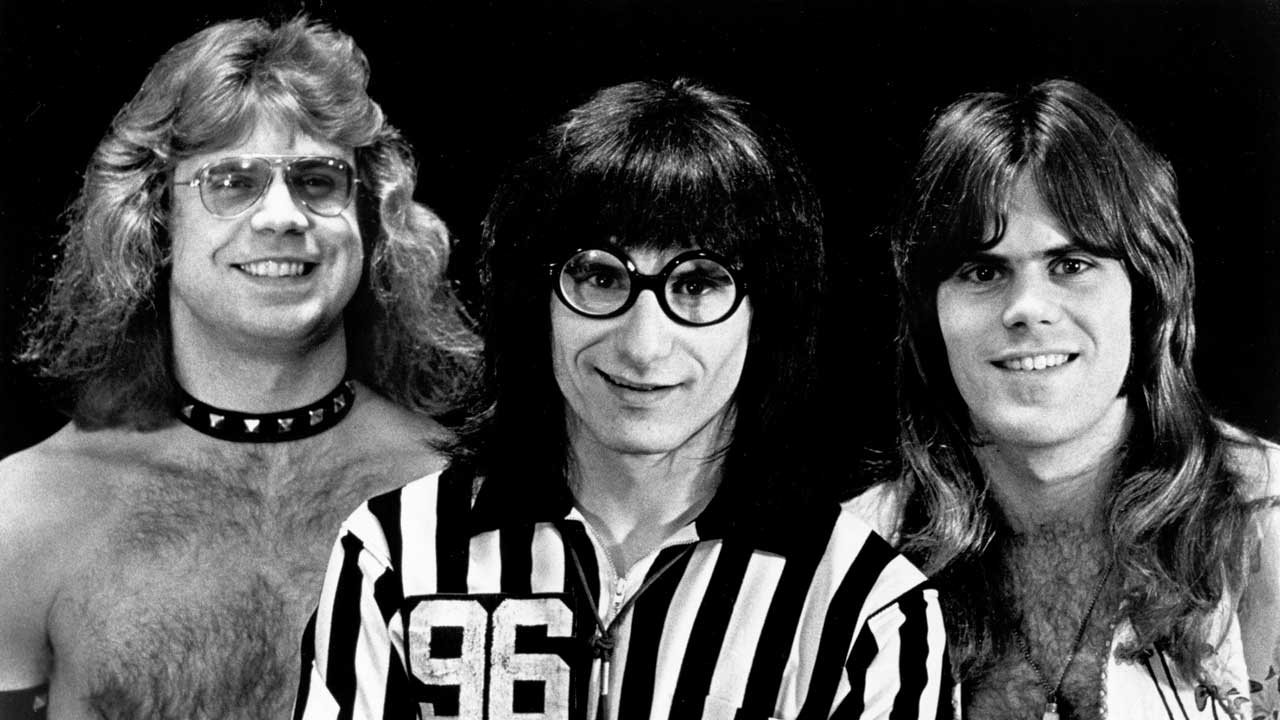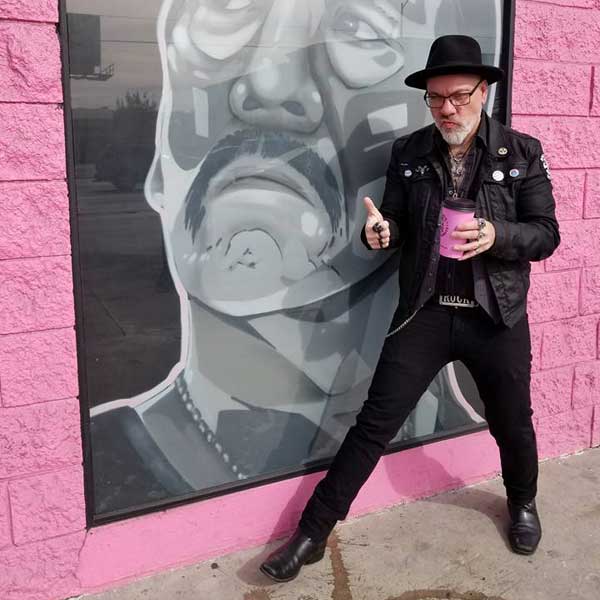The unheralded heroes of American glam, Brownsville Station were hairy/scary bruisers from Ann Arbor who dressed up in skintight spacesuits and thigh-high drag-queen boots. They wrote songs about beer and chicks and parties and blowing off school.
They looked like Kiss a year before Kiss did; when they switched to street-corner denim-demon outfits soon after, they looked like The Ramones a year before they did. They rocked-up reggae way before The Clash.
They released a ‘punk’ album in 1974 (School Punks), and revived good ol’ juvenile delinquency way before it was cool. Oh yeah, and they were responsible for 1973’s Smokin’ In The Boy’s Room, one of the most gleefully lunk-headed US megabits of the early 1970s.
Brownsville screeched to a halt in 1979, and with the sudden and unexpected death of singer/ guitarist Cub Koda in 2000 it appeared they might never leave the station again. But in 2012, guitarist Mike Lutz and drummer Henry ‘H-Bomb’ Wreck decided to get the band back together, and released a storming new album - coyly titled Still Smokin’.
“We call ourselves Brownsville Station only because Stark Naked & The Car Thieves was already taken,” jokes Lutz.
“Brownsville, Texas is where it actually came from,” explains Wreck. “It’s the southernmost city in the US.”
“It’s right on the Mexican border, and there’s all kinds of mayhem happening there,” says Lutz. “So it seemed appropriate for the kind of band we were.”
Like a lot of bands from that era and the Michigan area, mayhem was an integral part of the Brownsville experience. As were fashions even the New York Dolls would think twice about.
“I got my boots in Toronto,” Wreck remembers. “They went right up to my crotch. Then I started getting them made for me at this place in New York City. Later on Kiss, who I think were inspired by us, started getting theirs made at the same place.”
“It wasn’t so much of a fashion statement as it was that we were interested in entertaining people,” says Lutz. “We were a lively band on stage, a lot of energy, and anything that would make us more of a Broadway spectacle, in terms of clothing or anything, was good. It made it easier to follow us on stage. It’s easier to notice somebody if they’re wearing Day-Glo orange.”
It’s no wonder Brownsville mixed their pummelling party rock with visual outrage, considering the competition in Ann Arbor and Detroit at the time.
“It was dead-nut serious,” says Lutz. “You’re talking about The MC5 and The Up and The Stooges and Ted Nugent.”
“Mike went to school with Iggy Pop and Bob Seger,” Wreck says. “So we knew all those guys real well. Iggy was actually his class valedictorian in 1965.”
“Yeah,” chuckles Lutz, “but back then he was James Osterberg the Third.”
I’m admittedly taken aback. The godfather of punk actually did his homework and studied?
“Studied? That’s the ‘F’ word to us, man,” says Lutz. “I’m gonna deny being involved in this part of the conversation.”
Speaking of school, in 1973 Brownsville Station recorded and released their third album, Yeah! Full of bluesy shuffles, punchy hard rock and a thrashy Jimmy Cliff cover (Let Your Yeah Be Yeah), it ended with their goofy paean to teenage delinquency, Smokin’ In The Boy’s Room.
Anchored by the spoken-word intro by Koda (‘Do ya ever seem to have one of those days where everyone’s on your case from your teacher all the way down to your best girlfriend?’), this breezy high-school zero anthem shot up the charts and made Brownsville a household name overnight.
As Lutz says, they never saw it coming. “Cub and I wrote the song together. I confess that I personally never got into smoking in the boys’ room at school, but it seemed like a good topic to write about. It was fun and it was rebellious, and that was indicative of what Brownsville was about. But we didn’t think it was a hit.
"The funny thing is, when we got done with the album, Smokin’ is the last cut on the second side because nobody was really sure about it. But there was a radio station in Bangor, Maine and they started spinning it, and the phones just lit up."
Smokin’ In The Boy’s Room climbed to No.3 in the US. It was their biggest-selling hit, and by the end of the year America knew their name. Unfortunately the boys in Brownsville were too busy to notice.
“Back in those days the whole thing was about being out on the road and pushing your product, developing a fan base,” explains Lutz. “So with us it was still about doing that. It’s just that Smokin’ blew things wide open. We were making our reputation of being an energetic rock band. But after Smokin’ became a pop hit, people started to look at us as sorta bubblegum. It changed our career in that we became instantly popular to a lot of people, but it didn’t change the direction of the band."
“We still did 320 one-nighters that year,” says Wreck. “And we drove ourselves to every gig.”
“Our gold record was presented to us in a brown paper bag,” laughs Lutz. “What a lot of hoopla. That’ll keep you humble.”
Mötley Crüe covered Smokin’ on their 1985 album Theater Of Pain. It was a hit, reviving interest in Brownsville Station.
“We heard through the grapevine that the guys in Mötley Crüe were in the front row at a bunch of our gigs in LA,” recalls Wreck, “and that we were one of the band that inspired them.”
Did they like the Crüe’s version?
“Yeah,” says Lutz. “They stuck to the form of the song. It had a structure to it, and it has to be done that way. They honoured the song.”
With the resurgence of Smokin’, there were offers to re-form but timing wasn’t right. Wreck was producing Blackfoot, and Lutz was on tour with Ted Nugent. But while compiling a box set of unreleased material, the bandmates started jamming again.
“We popped a couple beers,” remembers Wreck, “and I said: ‘Michael, I’ve got this hook-line I think is pretty killer, and a melody, and four pages of rough lyrics.’ I started singing it to him, and he jumped up and played the piano, and then grabbed a guitar, and we wrote Make A Difference, our first song since 1979. We put the legacy project on the back burner and, like two 16-year-old kids with our first band, we dove in head first.”
And so the band were back in operation, and Still Smokin' was released. The title did not lie.
“We had a criteria for Still Smokin’,” says Lutz. “There were two things we wanted to make sure we had. We said if we came back we had to have something new to offer, and that we would do it in a big way.”
Were they surprised that this happened?
“Sure,” says Lutz,” But it makes sense. Our mantra is: don’t die until you’re dead.”

